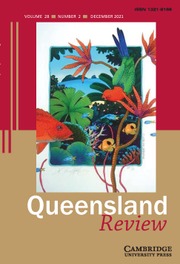No CrossRef data available.
Article contents
Going Forward to the Past: The Future of Literary Studies in Australian Universities
Published online by Cambridge University Press: 08 May 2014
Extract
The imminent death of the study of past literature in Australian universities has been pronounced many times since the 1980s. It seems to have been taking several decades to die, but its time may finally be upon us. When I first joined Griffith Humanities in 1981, the then Head of School, David Saunders, told me that though he might wish it otherwise, the literature of the past would always be studied in universities — if only because there was so much of it and because, like Everest, it was simply ‘there’. I now think he may have been wrong. It is likely enough, in my view, that some — mainly older — people will keep reading, studying and discussing the literary tradition for a long time to come: in reading groups, U3A classes and the like. More about that later. But I doubt if anyone will be doing it in Australian universities for very much longer.
- Type
- Articles
- Information
- Queensland Review , Volume 21 , Issue 1: A Tribute to Professor Patrick Buckridge , June 2014 , pp. 4 - 16
- Copyright
- Copyright © The Authors, published by Cambridge University Press 2014
References
Endnotes
1 For a more extended consideration of the pedagogy of appreciation, see my article, ‘The Age of Appreciation: Reading and Teaching Classic Literature in Australia in the Early Twentieth Century’, Australian Literary Studies 22(3) (2006), 342–56.
2 It may seem arbitrary to ascribe such importance to a single author — and there have, of course, been other theorists (e.g. Freud, Foucault, Derrida, Raymond Williams, Frederic Jameson, Tony Bennett) whose writings have also played a role. But Eagleton's writings, and in particular one book of Eagleton’s, Literary theory: An introduction, have been disproportionately influential in schools. In the case of that book, this is no doubt because — unusually — it combines the virtues of a comprehensive and simplified introduction to radical tendencies in literary theory with a humorous, engaging and bracingly polemical style. The strength of its influence can be found in the frequency with which the book has been cited and recommended, but more tellingly, perhaps, in the centrality of ‘Eagletonian’ terms and phrases like ‘gaps, silences and contradictions’ and ‘reading against the grain’ to the study rationales presented in Australian syllabus documents.
3 Simon Ryan, ‘Contextual knowledge and literary studies pedagogy’, unpublished Master of Higher Education thesis (unpublished), Griffith University (2008), p. 46.
4 All these terms, and others from the same paradigm, are to be found throughout the Queensland Senior English Syllabus documents that pre-dated the National English Curriculum that came into force in 2012. Particular clusterings can be found at English Extension (Literature) Senior Syllabus (Brisbane: Queensland Studies Authority, 2004–10), pp. 7, 15, 23.
5 Kathryn Schulz, ‘Why I despise The Great Gatsby’ The Vulture, 6 May 2013, accessed 5 December 2013, http://www.vulture.com/2013/05/schulz-on-the-great-gatsby.html; Joyce Carol Oates, Twitter post, accessed 5 December 2013, https://twitter.com/JoyceCarolOates/status/332215647801073665.
6 Arnold, Matthew, ‘Pagan and mediaeval religious sentiment’, in Essays in criticism, First Series (London: Macmillan, 1911), p. 216Google Scholar.
7 These sorts of claims probably originate with Matthew Arnold and other late nineteenth and early twentieth century advocates for the teaching of literature as a means of forming the taste and sensibility of all classes in society. See, for example, Baldick, Chris, The social mission of English criticism, 1848–1932 (Oxford: Clarendon Press, 1983)Google Scholar and more recently, Hilliard, Christopher, English as a vocation: The Scrutiny Movement (Oxford: Oxford University Press, 2012)CrossRefGoogle Scholar. They have had a long, and of course largely ineffectual, after-life in the late twentieth and early twenty-first centuries.
8 These more recent claims, while not entirely separate from the ‘generic skills’ arguments, have been mainly developed by theorists of the evolutionary functions of literature, such as Joseph Carroll, Dennis Dutton, Jonathan Gottschall, Brian Boyd and Steven Pinker.
9 Boyd, Brian, On the origin of stories: Evolution, cognition, and fiction (Cambridge, MA: Belknap Press, 2009)Google Scholar.
10 Pinker, Steven, The better angels of our nature: Why violence has declined (New York: Viking, 2011), Chapter 9Google Scholar.
11 Bennett, Tony, ‘Really useless “knowledge”: A political critique of aesthetics’, Thesis Eleven, 12 (1985), 8–52CrossRefGoogle Scholar. (To be fair, Bennett's damning phrase, borrowed from the Russian Formalist P. N. Medvedev, who used it in a 1928 essay, was applied to the philosophical project of Marxist aesthetics rather than ordinary literary criticism.)
12 For a clear and illuminating discussion of this concept, see Bennett, Tony, Formalism and Marxism (London: Methuen, 1979), pp. 46–50Google Scholar.


